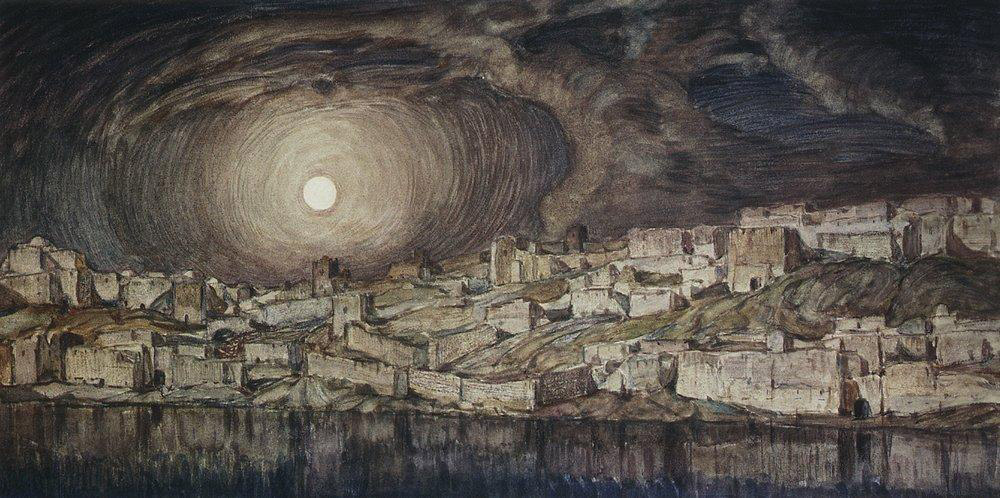Difference between revisions of "June 14, 2014"
| Line 1: | Line 1: | ||
__NOTOC__ | __NOTOC__ | ||
=Eyeing Us= | =Eyeing Us= | ||
| − | |||
<!-- ws:start:WikiTextHeadingRule:0:<h1> --> | <!-- ws:start:WikiTextHeadingRule:0:<h1> --> | ||
<!-- ws:start:WikiTextLocalImageRule:6:<img src="/file/view/LPOD-Jun14-14.jpg/513905858/LPOD-Jun14-14.jpg" alt="" title="" /> -->[[File:LPOD-Jun14-14.jpg|LPOD-Jun14-14.jpg]]<!-- ws:end:WikiTextLocalImageRule:6 --><br /> | <!-- ws:start:WikiTextLocalImageRule:6:<img src="/file/view/LPOD-Jun14-14.jpg/513905858/LPOD-Jun14-14.jpg" alt="" title="" /> -->[[File:LPOD-Jun14-14.jpg|LPOD-Jun14-14.jpg]]<!-- ws:end:WikiTextLocalImageRule:6 --><br /> | ||
| − | <em>Konstantin Bogaevsky, "Memories of Mantegna," 1910 image of painting from [http://www.huffingtonpost.com/2014/06/13/moon-artworks_n_5490098.html Priscilla Frank] in The Huffington Post</em><br /> | + | <em>Konstantin Bogaevsky, "Memories of Mantegna," 1910 image of painting from [http://www.huffingtonpost.com/2014/06/13/moon-artworks_n_5490098.html" rel="nofollow Priscilla Frank] in The Huffington Post</em><br /> |
<br /> | <br /> | ||
| − | The Moon is inspiring. For us who observe with telescopes it is a wondrous sight to behold every day and night that we catch it. But it has also inspired painters, including the Russian [http://en.wikipedia.org/wiki/Konstantin_Bogaevsky Bogaevsky], who created today's LPOD in 1910. This is one of twenty that a writer brought together for a story on Moon paintings. In this painting the Full Moon's effect is magnified by a vast series of halos, and clouds that arch over it like an eyebrow. It almost seems ominous, but the lack of people in the scene reduces that aspect; in fact, even the idea of a big creature overlooking all is weakened by the lack of people. Is everyone hiding inside? <em>(If the eyeball is this big the whole creature must be a giant.)</em> Perhaps it is just reciprocating our interest, staring down at us as we point our telescopes towards it.<br /> | + | The Moon is inspiring. For us who observe with telescopes it is a wondrous sight to behold every day and night that we catch it. But it has also inspired painters, including the Russian [http://en.wikipedia.org/wiki/Konstantin_Bogaevsky" rel="nofollow Bogaevsky], who created today's LPOD in 1910. This is one of twenty that a writer brought together for a story on Moon paintings. In this painting the Full Moon's effect is magnified by a vast series of halos, and clouds that arch over it like an eyebrow. It almost seems ominous, but the lack of people in the scene reduces that aspect; in fact, even the idea of a big creature overlooking all is weakened by the lack of people. Is everyone hiding inside? <em>(If the eyeball is this big the whole creature must be a giant.)</em> Perhaps it is just reciprocating our interest, staring down at us as we point our telescopes towards it.<br /> |
<br /> | <br /> | ||
| − | <em>[mailto:tychocrater@yahoo.com Chuck Wood]</em><br /> | + | <em>[mailto:tychocrater@yahoo.com" rel="nofollow Chuck Wood]</em><br /> |
<br /> | <br /> | ||
<hr /> | <hr /> | ||
Revision as of 23:00, 4 January 2015
Eyeing Us

Konstantin Bogaevsky, "Memories of Mantegna," 1910 image of painting from " rel="nofollow Priscilla Frank in The Huffington Post
The Moon is inspiring. For us who observe with telescopes it is a wondrous sight to behold every day and night that we catch it. But it has also inspired painters, including the Russian " rel="nofollow Bogaevsky, who created today's LPOD in 1910. This is one of twenty that a writer brought together for a story on Moon paintings. In this painting the Full Moon's effect is magnified by a vast series of halos, and clouds that arch over it like an eyebrow. It almost seems ominous, but the lack of people in the scene reduces that aspect; in fact, even the idea of a big creature overlooking all is weakened by the lack of people. Is everyone hiding inside? (If the eyeball is this big the whole creature must be a giant.) Perhaps it is just reciprocating our interest, staring down at us as we point our telescopes towards it.
" rel="nofollow Chuck Wood



